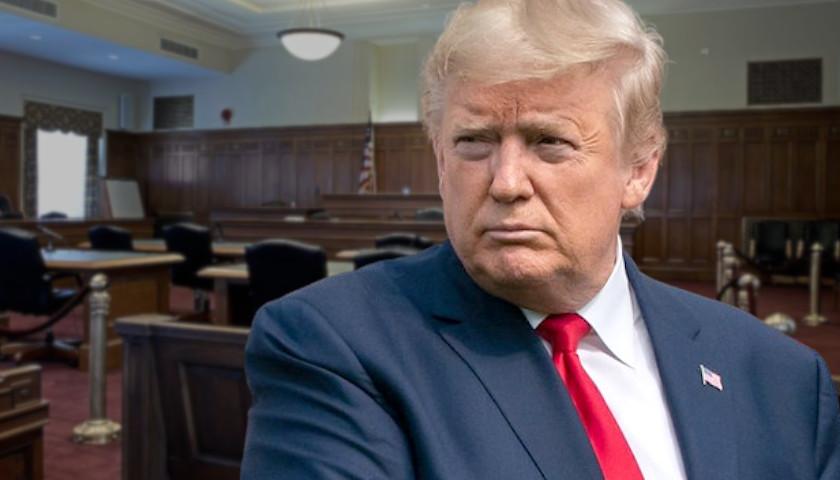Live from Music Row Friday morning on The Tennessee Star Report with Michael Patrick Leahy – broadcast on Nashville’s Talk Radio 98.3 and 1510 WLAC weekdays from 5:00 a.m. to 8:00 a.m. – host Leahy welcomed the original all-star panelist Crom Carmichael to the studio.
During the second hour, Carmichael explained Section 230 in relation to the actions of private and public companies suggesting evidence based on past Supreme Court rulings allowing for the government to operate their one-party agenda through Big Tech back door.
Leahy: We are joined by the original all-star panelist Crom Carmichael in studio. And Crom, I was watching the Tucker Carlson Tonight show last night and the chief policy officer of Parler there had some very chilling things to say about what’s going on with Parler. In particular, what struck me as very dangerous Crom is that it wasn’t just the Amazon subsidiary that handles servers that were ganging up against them. She went down a list of about it sounded like about two dozen technology providers and they’ve all abandoned Parler. And Parler may never be on again.
Carmichael: Abandoned? You mean shut them down. They shut them down. Abandoned is not nearly as aggressive. And they had to have acted in concert. There’s just it’s impossible to believe that all of these companies would have arrived at the same time. It defies logic. Let’s put it that way. to believe that these companies all came up with the same conclusion and acted act within 24 hours especially on a weekend.
Leahy: It happened like on a Saturday bad 11:59 p.m.
Carmichael: Or something like that. So, so I want to follow up with the conversation that we were having with Carl. And Carl maintained that private companies can do what they want to. Private companies can’t what they want to and even in serving customers.
Leahy: They are constrained by laws.
Carmichael: And their rules and regulations. Because I mean if you discriminate against a customer based on something that is prohibited by law and then then then the government can come after you. That and if you and if you don’t hire somebody that is that if you run afoul in that regard. But these technology companies they are they have protections by Section 230…
Leahy: The Communications Act passed in 1996 or 1997.
Carmichael: Yes. So they are to be treated differently up to a point. And so what I didn’t have in front of me when Carl and I were talking Wednesday is an article by Vivek Ramaswamy and Jed Rubenfeld.
Leahy: Very good by the Vivek Ramaswamy.
Carmichael: Well I got help from you. But what he points out is this is that I’m so I’m going to just quote from this story at The Wall Street Journal. Conventional wisdom holds that technology companies are free to regulate content because they are private and the first amendment protects only against government censorship.
That view is wrong. Google, Facebook, and Twitter should be treated as state actors under existing legal doctrine using a combination of statutory inducements and regulatory threats. Congress has co-opted Silicon Valley to do through the back door what the government cannot directly across accomplish under the Constitution. It is “axiomatic.” And the quote there is from a Supreme Court case.
So I’m quoting from the Supreme Court ruling. It is “axiomatic” the Supreme Court held in Norwood versus Harrison in 1973 that the government “may not induce, encourage, or promote private persons to accomplish what is constitutionally forbidden to accomplish for itself.” That’s what the Supreme Court ruling said.
The article then goes on to say that that is what Congress did. In other words, it induced these companies when it enacted Section 230 of the 1996 Communications Decency Act which not only permits tech companies to censor constitutionally protected speech but immunizes them against liability for doing so. The justices have long held that the provision of such immunity can turn private action into state action. And that’s what’s key here.
Leahy: Let me just stop for a moment to emphasize that. If they are state actors, that’s very different.
Carmichael: Yes.
Leahy: Than being private independent companies unconnected to the state?
Carmichael: Yes. And there are series of Supreme Court cases that have ruled that private companies become state actors under certain conditions. Now the justices have long held that the provision for such immunity can turn private action into state action. In a court case between the Railway Employees Department versus Hanson in 1956, they, meaning the Supreme Court, the justices found state action in private union employer closed shop agreements which force all employees to join the union.
Because Congress passed a statute immunizing such agreements from liability under state law. In Skinner vs. Railway Labor Executives Association in 1989 the court again found that state action in private conduct, and that is drug tests for company employees because Federal Regulations immunize railroads from liability if they conducted those tests. And so section 230 if I’m going to quote again from the article.
Section 230 is the carrot and there’s also a stick. Congressional Democrats have repeatedly made explicit threats to social media giants if they failed to censor speech that those lawmakers disfavor. And that the threat has been that we’ll do away with Section 230. So the combination of these actions and prior Supreme Court rulings show that there’s a very strong case that can be made that these giant tech companies, not because they’re giant, but because they are protected by Section 230 and they’re being intimidated by one particular party to do exactly what the tech companies have now done.
Leahy: Limit free speech in essence.
Carmichael: Yes, in which Congress cannot do on its own.
Leahy: Vivek is one of my new favorite writers.
Carmichael: Okay, good. I want Carl to know who these people are. Mr. Ramaswamy is the founder and CEO of Roivant Sciences and the author of the forthcoming book Wokenomics. Mr. Jed Rubenfeld who is a constitutional scholar has advised parties who are litigating or may litigate against Google and Facebook. So in the case of Rubenfeld, he is a constitutional scholar and Carl isn’t, and neither am I.
Leahy: So we play one on the radio.
Carmichael: And Carl occasionally plays one as a caller. (Laughter) But I defer to people who are wiser than me.
Leahy: Well that’s a very small list. (Laughter)
Carmichael: Oh, don’t go there. (Laughter)
Leahy: We’re just having too much fun here Crom. Look, I love this argument. Has it ever been made in court? Is it about to be made in court?
Carmichael: Well all I’m saying is there are three Supreme Court rulings on what constitutes a private company being a state actor. It hasn’t been made in court on these particular companies otherwise in Supreme Court would have already ruled that they are state actors. And if the Supreme Court rules they are state actors, then then it says essentially Section 230 disappears.
Leahy: It would be unconstitutional.
Carmichael: The act itself would be unconstitutional. so the limit of liability would be unconstitutional. and the and the facts of what has now happened make it would make it and we’ll make it. Because Parler has apparently lined up some lawyers to sue. Now whether or not these lawyers are threatened by the state…
Leahy: That’s another angle going on here.
Carmichael: Which is now going on with Forbes. By the way, Forbes magazine is no longer owned by the Forbes family.
Leahy: No kidding.
Carmichael: So that’s important.
Leahy: You know why? I figured that with the commentary that they came out with the other day.
Carmichael: Yes. I mean you scratch your head when you see the commentary where Forbes is actually saying that people who are associated with Trump should not be hired.
Leahy: Never get a job again.
Carmichael: Or any company that hires them or any law firm that hires them should be canceled. Now here’s the question for me because Michael it’s what I’ve talked about over and over again. A free society can only remain free so long as the members of the society are treated equally. And that is under the law.
But it’s also among each other if you have massive racism which Democrats claim there is systemic racism but apparently they aren’t. Which of course flies in the face of logic itself. If it’s systemic then they’re part of it. And I maintain to Carl that the Democrat Party has in fact and to anybody else too, by the way, the Democrat Party has been racist since its founding which was founded by a slave owner Thomas Jefferson.
Leahy: Wait until you hear the clip we have coming back in the next segment. It’s from one of your favorite people Crom.
Carmichael: Good, I’m looking forward to it.
Listen to the full second hour here:
– – –
Tune in weekdays from 5:00 – 8:00 a.m. to the Tennessee Star Report with Michael Patrick Leahy on Talk Radio 98.3 FM WLAC 1510. Listen online at iHeart Radio.
Photo “Big Tech” by Mike Mackenzie. CC BY 2.0.





